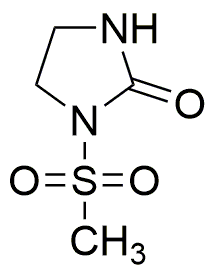1-Methanesulfonyl-2-imidazolidinone is widely utilized in research focused on:
- Pharmaceutical Development: This compound serves as a key intermediate in the synthesis of various pharmaceuticals, particularly in the development of drugs targeting neurological disorders due to its ability to enhance solubility and bioavailability.
- Agricultural Chemistry: It is used in the formulation of agrochemicals, providing effective solutions for pest control while minimizing environmental impact, making it a preferred choice for sustainable agriculture.
- Material Science: The compound is incorporated into polymer formulations to improve thermal stability and mechanical properties, which is essential for developing high-performance materials used in automotive and aerospace industries.
- Biochemical Research: Researchers utilize it as a reagent in various biochemical assays, enabling the study of enzyme activity and protein interactions, which are crucial for understanding biological processes.
- Cosmetic Formulations: Its unique properties allow it to be used in skincare products, enhancing the stability and efficacy of active ingredients, thus improving the overall performance of cosmetic formulations.
General Information
Properties
Safety and Regulations
Applications
1-Methanesulfonyl-2-imidazolidinone is widely utilized in research focused on:
- Pharmaceutical Development: This compound serves as a key intermediate in the synthesis of various pharmaceuticals, particularly in the development of drugs targeting neurological disorders due to its ability to enhance solubility and bioavailability.
- Agricultural Chemistry: It is used in the formulation of agrochemicals, providing effective solutions for pest control while minimizing environmental impact, making it a preferred choice for sustainable agriculture.
- Material Science: The compound is incorporated into polymer formulations to improve thermal stability and mechanical properties, which is essential for developing high-performance materials used in automotive and aerospace industries.
- Biochemical Research: Researchers utilize it as a reagent in various biochemical assays, enabling the study of enzyme activity and protein interactions, which are crucial for understanding biological processes.
- Cosmetic Formulations: Its unique properties allow it to be used in skincare products, enhancing the stability and efficacy of active ingredients, thus improving the overall performance of cosmetic formulations.
Documents
Safety Data Sheets (SDS)
The SDS provides comprehensive safety information on handling, storage, and disposal of the product.
Product Specification (PS)
The PS provides a comprehensive breakdown of the product’s properties, including chemical composition, physical state, purity, and storage requirements. It also details acceptable quality ranges and the product's intended applications.
Certificates of Analysis (COA)
Search for Certificates of Analysis (COA) by entering the products Lot Number. Lot and Batch Numbers can be found on a product’s label following the words ‘Lot’ or ‘Batch’.
*Catalog Number
*Lot Number
Certificates Of Origin (COO)
This COO confirms the country where the product was manufactured, and also details the materials and components used in it and whether it is derived from natural, synthetic, or other specific sources. This certificate may be required for customs, trade, and regulatory compliance.
*Catalog Number
*Lot Number
Safety Data Sheets (SDS)
The SDS provides comprehensive safety information on handling, storage, and disposal of the product.
DownloadProduct Specification (PS)
The PS provides a comprehensive breakdown of the product’s properties, including chemical composition, physical state, purity, and storage requirements. It also details acceptable quality ranges and the product's intended applications.
DownloadCertificates of Analysis (COA)
Search for Certificates of Analysis (COA) by entering the products Lot Number. Lot and Batch Numbers can be found on a product’s label following the words ‘Lot’ or ‘Batch’.
*Catalog Number
*Lot Number
Certificates Of Origin (COO)
This COO confirms the country where the product was manufactured, and also details the materials and components used in it and whether it is derived from natural, synthetic, or other specific sources. This certificate may be required for customs, trade, and regulatory compliance.


